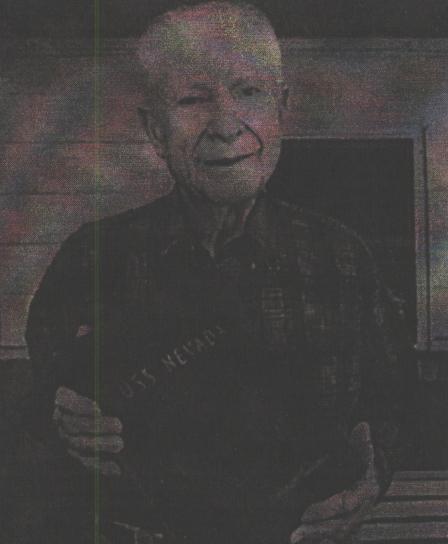Howard Philip Fyke US Navy USS Nevada |
Like many people of his generation, Howard Philip Fyke has no trouble remembering where he was when Japanese forces attacked Pearl Harbor. His memories, however, may be sharper than those who heard about the attack on the radio or by word of mouth because they come from the midst of battle. On December 7, 1941, Fyke was a 22-yearl-old seaman second-class aboard the battleship USS Nevada. At 7:55 a.m. he had finished breakfast and was in his cabin writing a letter home when he heard ringing bells alerting crewmembers to report to their stations. "By the time I got up to my station (the number three gun turret), we had been hit by a torpedo," he said. "There was a hole in the ship you could drive a car through." And the situation didn't improve when the other gunners manned their stations. They had projectiles to fire, but no gunpowder to set them off. The battleship had been on maneuvers around the Hawaiian Islands since the spring of 1940. Fyke said the ship had frequent "sham battles" and target practice. Ammunition was regularly exchanged for fresher projectiles and powder. The morning of December 7, the ship was caught off guard. The projectiles were there, but the powder hadn't arrived. Fyke said maybe the missing gunpowder was a blessing in disguise. The battleship took six or seven bomb hits in the course of the three-hour battle and might have met the same fate as the USS Arizona, which exploded, had there been powder on board, he said. Fortunately, the ship's anti-aircraft guns were fully equipped, and those were what the seamen needed to take down the planes. When the Japanese aircraft and two-man submarines began their early morning attack on the 94 vessels in the harbor, "it was like shooting fish in a barrel," Fyke said. "The noise was tremendous," Fyke said. "All the ships were firing on the planes, and we shot down several." He said he was called to man an anti-aircraft gun, and as he headed toward it, he heard the screaming of a bomb and a call to hit the deck. When he looked up, the anti-aircraft gun he was heading for was gone. The USS Nevada the oldest US battleship afloat at the time was taking in water but managed to keep moving toward the beach. Though the ship was badly damaged, the 1,500 men on board were still able to man the deck from the beach and fight back. "It was a total shock to us," Fyke said. "You couldn't visualize the damage that was done. The water was covered with oil, and it was burning. There were men trying to swim to safety who got caught in the fires and didn't make it ashore." When the battle was over, the men stood watch with Browning automatic rifles and machine guns, he said. "We had lost all our communication," he said. "We had orders to shoot any aircraft that came toward us and ask questions later. I know when a group of six planes came toward us, we shot them down. And they turned out to be our own planes." "Hungry and tired, the men didn't even realized the time until 9 p.m.", Fyke said. "We hadn't eaten since breakfast. We had warm bread and Vienna sausage to eat, and it was good." The USS Nevada was once again afloat in Hawaii in February 1942 after undergoing minor repairs. The scarred battleship was then repaired extensively in Washington from May through December 1942, Fyke said. From 1943 to 1944, he was again aboard the battleship for convoy duty, escorting ships full of men and supplies from the harbors of New York to Belfast, Northern Ireland, in preparation for the D-Day invasion at Normandy. Fyke left eh Nevada in April 1944 and served the remainder of his tour of duty on the USS Atlanta Light Cruiser. They were in Tokyo Bay when the Japanese signed the treaty. He was then assigned to the USS Wisconsin to return home. Fyke, a native of Carthage, Texas, was discharged December 12, 1945, after serving six years in the US Navy. He returned home and later moved to Odessa during the oil boom and spent 31 years working in the oil patch before his retirement. The 83-year-old veteran frequently shares his wartime experiences with elementary school children and has been interviewed several times through the years by high school students when November rolls around and they are assigned a Veterans Day story. Fyke said he was once again shocked when the World Trade Center was attacked September 11th. "In reality it was worse than Pearl Harbor because of the tremendous loss of civilian life," he said. He's worried that the United States government doesn't hold its military secrets as close as it used to. "If everyone knows what you're doing, how are you going to win?" he asked. He thinks the war on terrorism is going to last a long time, but believes "if you're going to go to war, go to war to end it, and don't pull out in the middle." Staunchly patriotic, Fyke is a member of the generation that will always buy American and will never own a Japanese car, said his wife Delorise. Those who survived the attack on Pearl Harbor are closely bonded, she said, even if they don't know each other. Fyke has attended three reunions of Pearl Harbor veterans, and is proud of the country he served from 1939 to 1945 for $21 dollars a month and three meals a day. "We had some pretty good food back then," he said with a laugh, "but a lot of it was messed up by the cooks." |
Information provided by Howard Philip Fyke. |


